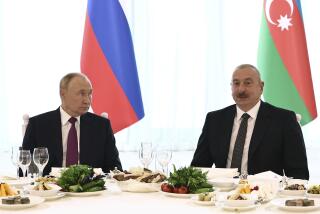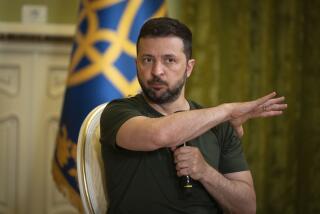Putin Promises Aid for Abbas
- Share via
RAMALLAH, West Bank — Russian President Vladimir V. Putin pledged Friday to provide equipment and training for Palestinian security forces to help them rein in militant groups.
Putin, ending two days of meetings with Israeli and Palestinian leaders, said his government would begin by supplying helicopters and communications equipment. Russia then plans to train Palestinian security officers in Moscow before deciding on further assistance, he said.
Putin spoke after meeting with Palestinian Authority President Mahmoud Abbas, who has vowed to curb militant violence against Israel and bring order to the streets of the West Bank and Gaza Strip.
“If we expect President Abbas to fight terrorism, he cannot do that with only stones in his hand,” Putin said during a news conference with Abbas at the presidential headquarters here.
The Russians plan to provide two transport helicopters for Abbas’ use, replacing aircraft used by the late Yasser Arafat until they were destroyed by Israeli forces during the intifada, or Palestinian uprising.
Putin appeared to have shelved plans to supply 50 armored personnel carriers, an idea that drew Israeli opposition on grounds that the vehicles might be used by militants. He did not discuss the armored vehicles when asked about them during the news conference.
Palestinian authorities were permitted to have similar Russian-made vehicles under a 1993 interim peace accord, but most were destroyed during the fighting with Israel that began in 2000, Palestinian negotiator Saeb Erekat said.
Mark Regev, a spokesman for Israel’s foreign ministry, said the issue of Russian aid to the Palestinians had come up during talks between Putin and Israeli leaders, including Prime Minister Ariel Sharon, a day earlier.
“They gave us a commitment that they will coordinate with us their support for the PA,” Regev said.
Putin’s stopover in the West Bank began with the laying of a wreath at Arafat’s glass-encased tomb. Putin arrived Wednesday night in Jerusalem, the first visit to Israel by a Kremlin leader since the nation was established in 1948. After the talks with Israeli and Palestinian leaders, which he described as fruitful, Putin vowed that his government would become more involved in Middle East peacemaking. Russia is one of the four entities -- including the United States, United Nations and European Union -- that sponsored the diplomatic initiative known as the road map, which envisions a two-state solution to the Israeli-Palestinian conflict.
Those efforts have been dominated by the United States, and Russia so far has taken a back seat. The former Soviet Union was a major player in the region, backing Arab regimes and the Palestine Liberation Organization. Representatives of the four sponsors are to meet in Moscow on May 8.
The Russian leader said that he remained committed to hosting an international conference on the peace process this fall, but that he envisioned a gathering of experts, rather than of political leaders. Israel reacted coolly Wednesday to Putin’s proposal for a conference, saying it had made insufficient progress with the Palestinians to hold such a meeting.
But Abbas on Friday expressed strong support for the conference and said the Palestinians were ready to move quickly to talks aimed at a permanent solution to the conflict.
Abbas, elected in January, said the new Palestinian leadership would fulfill its promises to crack down on fighters who violated a truce declared by Israel and the Palestinians at a summit in February.
“We will confront them,” Abbas said.
The main Palestinian militant groups declared a conditional cease-fire of their own last month. Despite weeks of relative calm, Israeli officials say Abbas has not acted to arrest and disarm militants.
Abbas hopes to quiet the gunmen by incorporating the fighters into the Palestinian forces. Abbas this week warned that he would use an “iron fist” in dealing with truce violators. Two suspects in the Gaza Strip were arrested Thursday for allegedly launching mortar attacks on Jewish settlements, Israel Radio reported.
In recent weeks, Abbas consolidated about a dozen overlapping security agencies into three branches, forcing hundreds of senior officers to retire.
Putin said those efforts would require more resources. Abbas said Palestinian security forces had lost much of their capacity due to the fighting with Israel.
The Israeli newspaper Haaretz reported Friday that Israel was resisting a U.S. proposal to arm Palestinian police.
More to Read
Sign up for Essential California
The most important California stories and recommendations in your inbox every morning.
You may occasionally receive promotional content from the Los Angeles Times.










